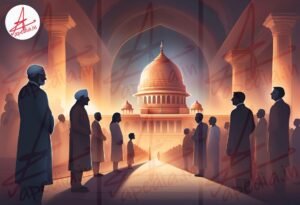This section covers the most crucial articles of the Indian Constitution, frequently tested in competitive exams. Grasping their importance is vital for anyone aiming for success in government exams and understanding the political fabric of India.
One-liner Highlights
- Article 14: Guarantees equality before the law.
- Article 19: Ensures freedom of speech and expression.
- Article 21: Protects life and personal liberty.
- Article 32: Right to approach the Supreme Court for constitutional remedies.
- Article 74: Defines the role of the Council of Ministers in aiding the President.
- Article 79: Establishes the structure of Parliament.
- Article 124: Supreme Court of India formation.
- Article 356: President’s Rule in states.
Fundamental Rights (Part III)
The Fundamental Rights section of the Indian Constitution is one of the most significant as it safeguards the basic civil liberties of the people. These rights are enforceable in the court of law, and any violation can be challenged in the judiciary.
- Article 14: The foundation of India’s justice system, this article enforces equality before the law. It aims to eliminate discrimination and promotes a uniform application of laws. Its broad implications mean no one is above the law, ensuring that all individuals are treated the same by the judiciary and public authorities.
- Article 15: A robust pillar against discrimination, this article ensures no citizen is discriminated against on grounds of religion, race, caste, sex, or place of birth. This article has played a monumental role in promoting equality, particularly for historically marginalized communities.
- Article 16: This article guarantees equality of opportunity in public employment. It enshrines the principles of fairness in hiring practices, prohibiting discrimination in government jobs, and ensures that merit and competence prevail over prejudice.
- Article 19: Often considered the lifeblood of democracy, Article 19 grants citizens several freedoms, including freedom of speech, assembly, association, and movement. These rights are essential for the functioning of a vibrant, open society, encouraging free expression and the exchange of ideas.
- Article 21: The right to life and personal liberty has been interpreted expansively by the courts, extending far beyond mere survival. It includes the right to live with dignity, personal autonomy, privacy, and, in some cases, the right to health and education.
- Article 32: Described as the “heart and soul” of the Constitution by Dr. B.R. Ambedkar, Article 32 grants the right to move the Supreme Court to enforce fundamental rights. It acts as the ultimate protector of citizens’ rights, offering a mechanism to ensure their enforcement.
Directive Principles of State Policy (Part IV)
Unlike Fundamental Rights, Directive Principles are non-justiciable, meaning they cannot be legally enforced. However, they serve as guiding principles for the state to frame laws and policies aimed at achieving social justice and welfare.
- Article 40: Directs the state to organize village panchayats, empowering local self-governance and decentralization of power. This article strengthens democracy at the grassroots level, fostering community participation.
- Article 41: Suggests that the state must provide the right to work, education, and assistance for the needy. Although not enforceable, this principle highlights the government’s responsibility to create an environment conducive to employment and education.
- Article 43: A call for fair working conditions and wages, this article underlines the state’s role in securing a decent standard of living for workers, promoting human dignity, and eradicating exploitation in the labor sector.
Union Government (Part V)
- Article 52: Establishes the office of the President, who is the formal head of the state and supreme commander of the armed forces. The President’s role, while largely ceremonial, holds significant constitutional duties.
- Article 74: Ensures that the Council of Ministers, headed by the Prime Minister, assists and advises the President in executing the day-to-day affairs of governance. This article highlights the importance of collective responsibility and parliamentary accountability in a democratic setup.
Parliament (Part V)
- Article 79: Sets up the two houses of Parliament, namely the Rajya Sabha (Council of States) and the Lok Sabha (House of the People). It is through these houses that laws are debated, passed, and enacted.
- Article 80 & 81: Outline the composition of the Rajya Sabha and Lok Sabha, respectively, detailing the number of members, qualifications, and election processes.
- Article 105: Grants MPs freedom of speech in Parliament and ensures parliamentary immunity, meaning members cannot be held accountable for their speeches or votes in the House.
State Government (Part VI)
- Article 152 & 161: Establish the Governor’s role in a state, defining their powers and responsibilities. Governors act as the President’s representative at the state level, with powers ranging from calling legislative sessions to granting pardons.
Judiciary (Part V)
- Article 124: Establishes the Supreme Court of India, the highest judicial authority in the country, responsible for interpreting the Constitution and safeguarding fundamental rights.
- Article 125 & 217: Outline the powers, duties, and appointment procedures for judges of the Supreme Court and High Courts, respectively, ensuring a robust and independent judiciary.
Local Government (Part IX)
- Article 243 & 243-A: Call for the establishment of panchayats and gram sabhas, marking a significant step towards decentralization and promoting local governance.
Schedules
- Seventh Schedule: Divides powers between the Union, State, and Concurrent Lists, defining the legislative domain of both the Union and State governments.
- Ninth & Tenth Schedule: Focus on protecting specific laws from judicial review and the Anti-Defection Law to ensure political stability.
Additional Articles
- Article 356: Grants the Union government the power to impose President’s Rule in a state in case of the breakdown of constitutional machinery.
- Article 370: Historically granted special autonomy to Jammu and Kashmir, until it was abrogated in 2019.
- Article 368: Lays down the procedure for amending the Constitution, a vital provision that ensures the document’s relevance with changing times.






